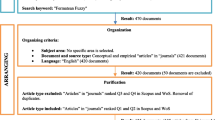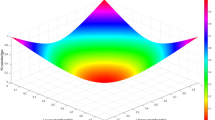Abstract
This paper proposes a fuzzy dependence-index for construction of the probabilistic models considering dependent relation for solving the reasoning problem. It is important for constructing the joint probability-distribution to consider the dependency of events. We consider that some vagueness is included in the dependency. Because causal relationship of among events is uncertain, it is difficult to express dependency as definite value. In this paper, we classify the dependent relations, and apply the fuzzy probability to calculation of the dependence-index. Then, the fuzzy dependence-index is defined to consider dependency with fuzziness. Using the fuzzy dependence-index, we calculate the joint probability of multi-events for constructing the probabilistic model.
Similar content being viewed by others
References
Suzuki M, Matsushima T, Hirasawa S (2000) On a Reasoning model and method for uncertainty (in Japanese). Information Processing Society of Japan 41(1)
Azuma R, Miyagi H (2006) On a reasoning method considering uncertainty with fuzziness (in Japanese). Trans Institute of Systems, Control and Information Engineers 19(7):265–273
Mabuchi S (2003) Credibility of a combined result of mutually dependent observations with uncertainty and contradiction (in Japanese). Jpn Soc Fuzzy Theory Intelligent Informatics 15(4):452–464
Mabuchi S (1997) An interpretation of membership functions and the properties of general probabilistic operators as fuzzy set operators (II). Extention to three-valued and interval-valued fuzzy sets. Fuzzy Sets ans Systems: 31–50
Lucas DJ (1995) Default correlation and credit analysis. J Fixed Income 4(4):76–87
Davis JP, Hall JW (2003) A software-supported process for assembling evidence and handling uncertainty in decision-making. Decision Support Systems 35:415–433
Onisawa T (2003) Fuzziness in system reliability analysis and fuzzy theory applications (in Japanese). J Jpn Soc Fuzzy Theory Intelligent Informatics 15(1):42–60
Tanaka H, Fan LT, Lai FS, Toguchi K (1983) Fault tree analysis by fuzzy probability. IEEE Trans Reliability R-32:453–457
Yu P, Park WS (2000) Combination and evaluation of expert opinions characterized in terms of fuzzy probabilities. Annals of Nuclear Energy 27:713–726
Kaufman A, Gupta MM (1988) Fuzzy mathematical models in engineering and management science. North-Holland, Sole distributors for the USA and Canada, Elsevier
Author information
Authors and Affiliations
Corresponding author
Additional information
This work was presented in part at the 13th International Symposium on Artificial Life and Robotics, Oita, Japan, January 31–February 2, 2008
About this article
Cite this article
Azuma, R., Miyagi, H. Probabilistic models considering dependent relation in reasoning for decision-making. Artif Life Robotics 13, 228–233 (2008). https://doi.org/10.1007/s10015-008-0551-3
Received:
Accepted:
Published:
Issue Date:
DOI: https://doi.org/10.1007/s10015-008-0551-3




